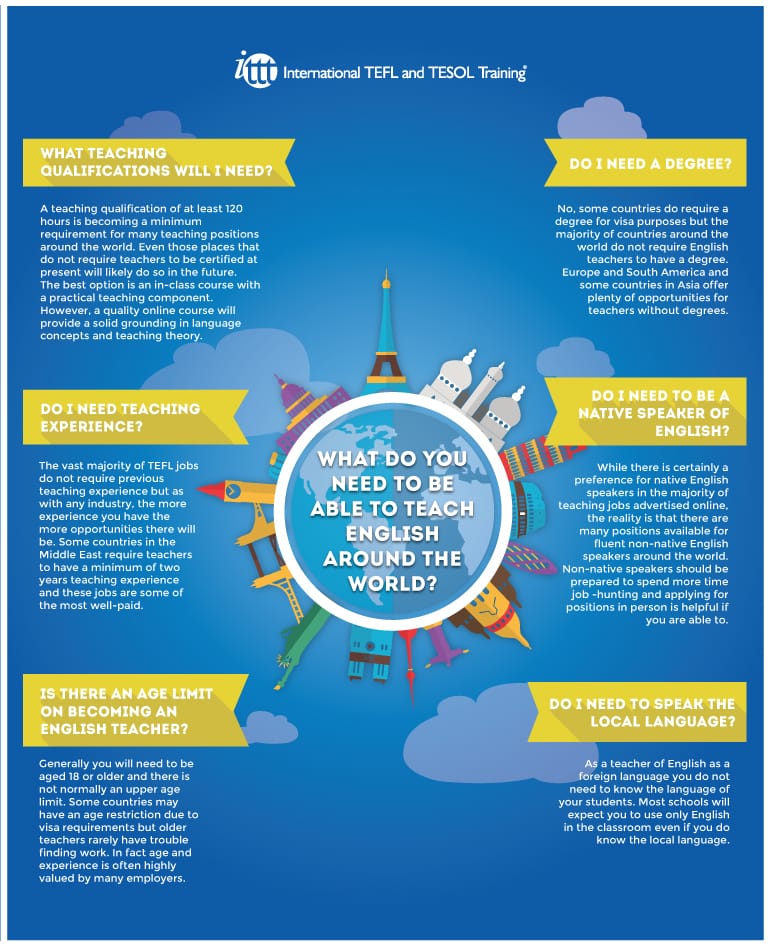What are the requirements for TEFL certification?
To teach English abroad all you truly need is a strong desire to embark on a new adventure and a teaching qualification that demonstrates to potential employers that you have received some level of teacher training. In this context, the internationally recognized qualification is a TEFL certificate, and these courses typically have minimal entry requirements.
What level of English is required to take a TEFL course?
Having a strong level of English comprehension is the most fundamental requirement for enrolling in a TEFL certification course. Non-native English speakers are just as welcome as native speakers, provided they possess a solid understanding of written and spoken English. The demand for EFL teachers worldwide is immense, and there is frequently a shortage of qualified teachers in numerous regions. Thanks to this robust demand, numerous teaching positions are available, and non-native English speakers are encouraged to apply for jobs in most countries. Interestingly, at ITTT, we often see more non-native English speakers enrolling in our TEFL courses than native speakers.
What age limits are there with TEFL courses?
The extensive global demand for TEFL qualified teachers means that job opportunities exist for teachers of all age groups. To enroll in a TEFL certification course with ITTT, you only need to be over 18; there are no upper age limits. Across the world, you will encounter teachers of various ages working in diverse classroom settings, ranging from young students taking a gap year to retirees seeking a new direction. TEFL qualified teachers have a multitude of options available to them, regardless of their age.

What educational background do I need to take a TEFL course?
At ITTT, we do not have any specific academic prerequisites for enrolling in our courses. As long as you have a strong command of the English language and a genuine desire to learn how to effectively teach it, you are welcome to join any of our certification programs. It is important to note that after completing the course, there are a few countries where having a degree is a requirement for obtaining a work permit. While this is the case in some popular teaching destinations like China, Japan, and South Korea, there are numerous other countries that are open to teachers with varying educational backgrounds. Consequently, we do not impose qualification requirements when enrolling in our TEFL courses to ensure accessibility for a wide range of trainees.
Do English language teachers need to be bilingual?
No, TEFL qualified teachers do not need to be proficient in any language other than English. It is entirely possible to teach English without knowledge of your students' native language. This is because all of our TEFL certification courses adhere to the immersion principle of language learning. Regardless of the various languages spoken by the teacher or the students, during a TEFL lesson, English is the exclusive language of communication for everyone involved. The immersion method aims to recreate the conditions that language students would encounter if they were learning the language independently in an English-speaking country.
Do qualified teachers still need to complete a TEFL course?
Many qualified teachers choose to transition into teaching English as a foreign language, either domestically or abroad, and often assume that their existing teaching credentials are sufficient. However, this is typically not the case, as teaching English requires a distinct set of skills and knowledge that may differ from what many traditional educators possess. While having a background in mainstream teaching can be an advantage when applying for EFL jobs, most employers still expect candidates to hold a TEFL qualification. This qualification ensures that teachers have the specific understanding and expertise required for this unique sector of education.
Do I need to know a lot about grammar to teach English abroad?
A solid understanding of English grammar is indeed a crucial component of teaching English to non-native speakers. However, it is not a prerequisite to have this knowledge before enrolling in a TEFL course, as English grammar is typically a substantial part of your training. While any pre-existing knowledge of grammar can be advantageous, the majority of TEFL trainees start their courses with only a basic understanding of English grammar, which is gradually expanded upon as the course progresses.
By the end of your training, you should have absorbed enough information to confidently teach essential grammar concepts. However, it is important to note that a comprehensive and deep understanding often develops over an extended period of teaching regular classes, with hands-on experience contributing significantly to your expertise in English grammar.






